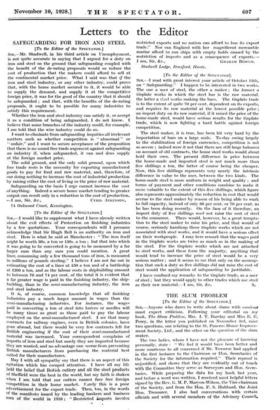[To the Editor of the SPECTATOR].
SIR,—I read with great interest your article of October 13th, on "Safeguarding." I happen to be interested in two works. The one a user of steel, the other a maker ; the former a tinplate works in which the steel bar is the raw material, the latter a steel works making the bars. The tinplate trade is to the extent of quite 70 per cent. dependent on its exports, and requires its raw material at the lowest possible price ; an import duty on its raw material, if it raised the price of the home-made steel, would have serious results for the tinplate trade, which is now fighting a hard battle against foreign competition.
The steel maker, it is true, has been hit very hard by the importation of bars on a large scale. To-day owing largely to the stabilization of foreign currencies, competition is not so severe ; indeed were it not that there are still large balances on account of old contracts, the home steel works would about hold their own. The present difference in price between the home-made and imported steel is not much more than five shillings a ton, the latter of course being the cheaper. Now, this five shillings represents very nearly the intrinsic difference in value to the user, between the two kinds. The home-made steel is more uniform in weight and quality ; and terms of payment and other conditions combine to make it more valuable to the extent of this five shillings, which figure also represents approximately the reduction in cost that would accrue to the steel maker by reason of his being able to work to full capacity, instead of only 66 per cent. or 70 per cent, as he has been doing recently. On the face of it therefore, an import duty of five shillings need not raise the cost of steel to the consumer. There would, however, be a great tempta- tion to the steel maker to raise his price, and that would of course, seriously handicap those tinplate works which are not associated with steel works, and it would have a serious effect on their workpeople. I may here remark that the wages paid in the tinplate works are twice as much as in the making of the steel. For the tinplate works which are not attached to steel works, and these form the majority, anything that would tend to increase the price of steel would be a very serious matter ; and it seems to me that only on the assump- tion that such a duty as five shillings did not raise the cost of steel would the application of safeguarding be justifiable.
I have confined my remarks to the tinplate trade, as a user of steel ; but they would apply to other trades which use steel as their raw material.—I am, Sir, &c. S.












































 Previous page
Previous page